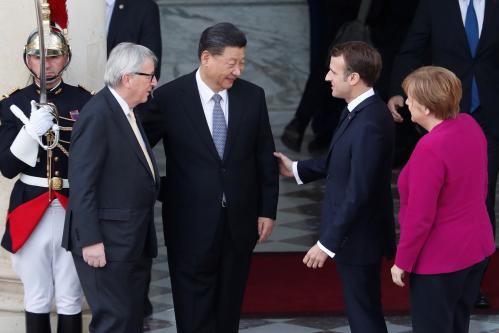Brexit has sparked fears of political contagion to the rest of the EU. Populist parties in France, the Netherlands, Italy, Sweden, Austria, and Denmark have already expressed support for referendums on EU membership. If Britain can prove it is possible to thrive outside the EU, it may strengthen these populist forces and spell the end of European integration, or so the argument goes.
Fear of political contagion is why many European leaders want to take a tough line in Brexit negotiations and make an example of Britain. As Elmar Brok, member and chairman of the European Parliament’s Foreign Affairs Committee told The Economist, “Out is out. We have to prevent copycats now.” Political contagion has emerged as an incredibly powerful and important idea that is poised to shape Europe’s future. Unfortunately, it has been repeated as mantra and has not been subjected to careful scrutiny.
How Brexit impacts the eurozone and the EU
Let’s begin with what Britain can be compared to. There are 28 members of the EU. Nineteen are members of the eurozone and nine (including Britain) are not. Exiting the EU is a fundamentally different, and more dangerous, proposition for eurozone members than EU states with their own currency. A eurozone member cannot leave the EU without leaving the euro and leaving the euro is almost impossible for all countries except for a couple of countries that could expect their own currency to appreciate.
As many leading economists have shown, for the vast majority of eurozone members (including France), exiting the euro would create the mother of all bank runs, devastate savings, and likely trigger a major financial collapse. This is why Cyprus and Greece both decided to stay in the euro despite having strong incentives to leave. Nobody has figured out how to unwind the euro without tremendous economic risk—a risk that dwarfs anything the British people face today.
The bottom line is that there is little risk of contagion from Brexit to eurozone member states because currency union provides an additional firewall, for good or ill.
The bottom line is that there is little risk of contagion from Brexit to eurozone member states because currency union provides an additional firewall, for good or ill. Populist parties can call for a referendum but even if they were to win power, which is very unlikely in most member states, they would face insurmountable barriers as to how to execute an exit, just as Syriza did in Greece when they went eyeball to eyeball with Germany in the summer of 2015 and lost. And they know it. The Five Star Movement in Italy is probably the populist party with the highest likelihood of winning power in the next few years. It used to support a referendum on the euro but actually changed its position within hours of Brexit to calling for working for change from within the system.
If one takes away the 19 members of the eurozone, this leaves eight other countries: Bulgaria, Croatia, the Czech Republic, Hungary, Poland, Sweden, and Romania. Hungary has a nationalist government already but it opposes exit from the EU. Poland has a deeply Euroskeptic government in the Law and Justice Party but it too is opposed, not least because of the hundreds of thousands of Polish workers who are resident elsewhere in the EU. A poll in Sweden days after Brexit showed an overwhelming majority in favor of EU membership. The other nations listed are absent from the regular list of countries where contagion might spread to.
Where the real risk of contagion lies
For the sake of argument, let’s assume that the U.K. can secure a deal like Norway’s. Would that spark contagion throughout the EU? Hardly. After all, the Norwegian model was not much of a deterrent to nations wanting to join the EU in the first place.
Real contagion stems from the lack of growth in Europe and the perception that EU…economic orthodoxy is making things worse, not better.
There is a risk of contagion, but it is not from the spectacle of Britain successively leaving without harsh penalties. Real contagion stems from the lack of growth in Europe and the perception that EU, especially German, economic orthodoxy is making things worse, not better. If the EU cannot address this problem, populist and nationalist parties will continue to gain ground. The risk that other countries will emulate the British example pales in comparison to these dangers.
It is understandable that the EU will protect its own interests in a negotiation with Britain. No one should expect a sweetheart deal. Any negotiation—even if it meets the Norwegian standard—will result in an arrangement that is worse than what Britain has now. That it itself should dissuade others from following suit. The strategic question facing Europe’s leaders is whether other EU member states look beyond their own interests to impose extra costs designed to have a deterrent effect on others. Such a step would be a profound mistake. It is directed at a risk that is exaggerated and it would poison relations between the EU and Britain. It would destroy any prospect of a second referendum and a reversal of Brexit because it would inflame nationalist passions. And, it would have a devastating economic impact, which really would be contagious and would do much more to empower populists than the example of Brexit ever could.
The Brookings Institution is committed to quality, independence, and impact.
We are supported by a diverse array of funders. In line with our values and policies, each Brookings publication represents the sole views of its author(s).







Commentary
The Brexit contagion myth
June 29, 2016